Wasn't cash supposed to be a thing of the past?
Of late, there have been clear signs that cash will remain in widespread use in many countries around the world.
The stock of Hungary's leading money printing company is up 135% since October 2023, when Undervalued-Shares.com paid it a visit.
There is another such publicly listed company that now warrants a closer look.
Investors may be able to bag a relatively easy 40-60% over the coming 12 months, by latching onto a determined British activist investor.
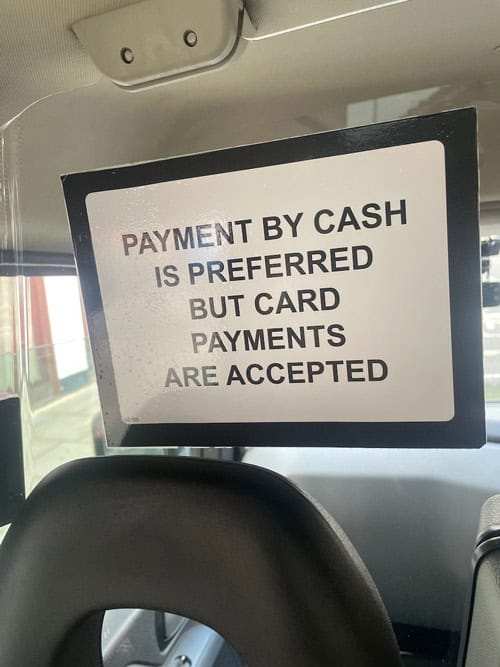
Such signs have sprung up in black cabs across London.
An industry unlike any other
Banknotes are a fascinating subject.
If you fancy a peak at the business of producing them, try to pick up "Moneymakers: The Secret World of Banknote Printing" by German journalist Klaus W. Bender.
Published in 2006, this legendary book lifts the veil on an industry that long enjoyed absolute secrecy. After years of research in the US, Europe and Latin America, Bender managed to lay his hands on a lot of material that would not normally be accessible to outsiders. In fact, it was claimed at the time that the industry of money printers tried to prevent his book from being published.
Bender's tome has since become a real hard-to-get item. It's possible that it has become so rare because the industry mopped up the available copies – similar to "The Brotherhood of Money: The Secret World of Bank Note Printers", published by Murray Teigh Bloom in the early 1980s. Nowadays, if you can find a copy of the English version of Bender's book, it might set you back USD 800 (like this copy currently available on eBay). The German version is slightly more readily available, and cheaper.
I managed to lay my hands on one of the rare English versions and found a fascinating read. In fact, to help preserve it for posterity, I had my precious copy cut, scanned, and turned into a PDF. *wink wink*
As the book describes in great detail, this is an industry with truly high barriers to entry. The market is divided among a small number of players, and some of them are more famous than others – such as Britain's De La Rue (ISIN GB00B3DGH821, UK:DLAR). The 210-year-old company literally invented the concept of printing modern banknotes, and allegedly at one point printed one third of the world's circulating money.
It's not been a good stock to own for investors, though.
Activists tearing out their hair
De La Rue is one of just a handful of for-profit companies that hold a significant market share in the printing of banknotes. France's Oberthur also ranks among them, Crane NXT (ISIN US2244411052, NYSE:CXT) in the US, and Giesecke+Devrient in Germany. Besides, there are many central banks with their own printing facilities.
Back in the 1990s, De La Rue was a highly priced stock with a significant following among analysts and investors. In 1994, it traded as high as 1,200 pence. It's been downhill ever since. Currently trading at 91 pence, the stock had traded as low as 30 pence in spring 2023.
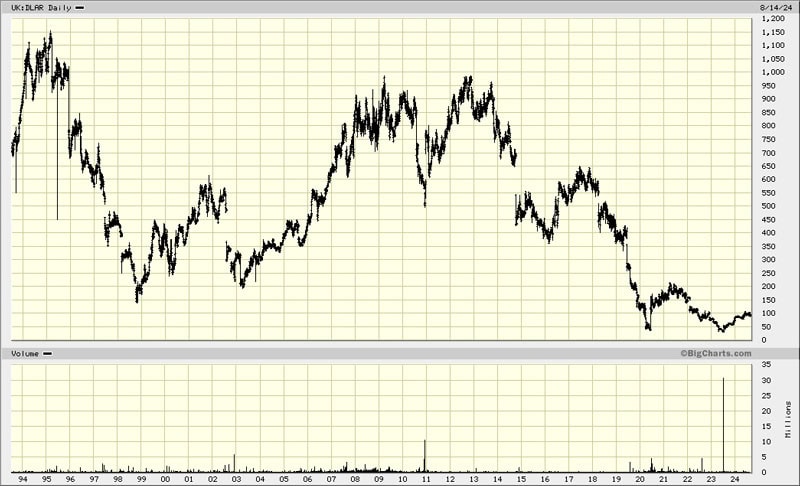
De La Rue.
What had happened to the company?
The rise of card payments was just one of many troubling factors hitting De La Rue (as described in this Weekly Dispatch of June 2020).
Even back then, a British activist investor, Crystal Amber Fund (ISIN GG00B1Z2SL48, UK:CRS), was wrestling with the company. De La Rue had famously turned down a takeover offer of 935 pence per share in 2011, which made shareholders all the more upset with management when subsequent years produced nothing but losses.
The Guernsey-based fund had started buying stock in De La Rue as far back as 2017, when the share price was still trading above 500 pence. Its efforts to force change at De La Rue took ages and brought mixed results, but it recently resulted in a game-changing decision.
New board leadership and a valuable second division
While Crystal Amber failed to get its preferred candidate for chairman onto the board, the chairmanship did change in May 2023 – a sign of De La Rue giving in to outside pressure after all. The new man, Clive Whiley, was previously the chairman of Dignity plc, a leading UK funeral provider that Undervalued-Shares.com had identified as a takeover target (and which a few months later received a bid).
Following his appointment, Whiley ordered the board to carry out a strategic review, including a potential sale of the group's divisions.
In May 2024, De La Rue concluded that it could be broken up or merged with another business. In fact, the company at the time stated that it was already in discussions with a number of parties "who have made proposals in relation to, or expressed interest in, either of the group's divisions".
There is no certainty at this stage that offers for the two divisions will be made (or accepted), but it certainly does look like De La Rue has effectively put itself up for sale.
Intriguingly, the company offers the same two-tier product range that produced such stunning returns recently for shareholders of Hungary's ANY Security Printing Company (ISIN HU0000093257, HU:ANY); also found in some stock databases under its native Hungarian name, Állami Nyomda Nyrt.
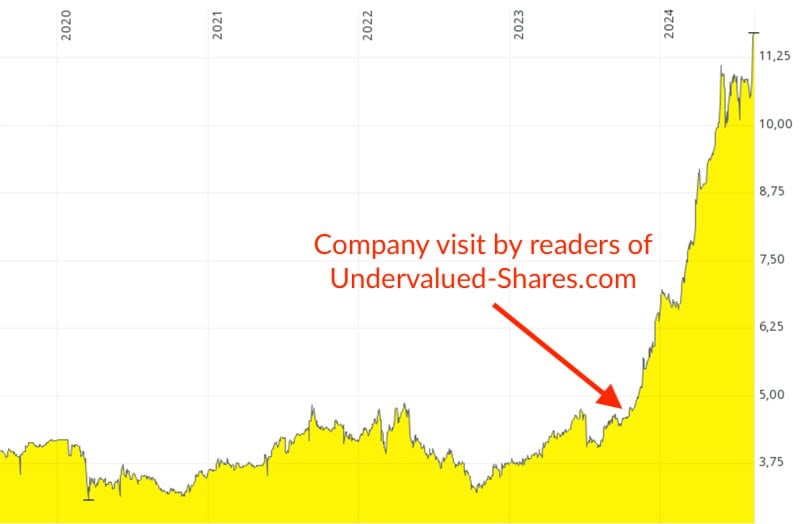
Állami Nyomda Nyrt.
Using its know-how for producing banknotes, both ANY and De La Rue have long diversified into other verification products and services. Both companies now also produce secure identification documents on paper, out of plastic, and digitally. This includes passports, election forms, visa stickers, tax and revenue stamps, corporate loyalty cards, lottery forms, driving licenses, vaccine passports, bank cards, ministerial letters, and similar.
Why is that such an interesting business to diversify into?
Authentification services are a growth market. Globally, over one billion people are still without any ID document at all. Sectors such as government, healthcare, and finance are also scaling up their digitisation, requiring secure documents from users to.
Plus, printing cash has recently turned out to be a more resilient business than many had expected.
Cash will fight another day
In September 2023, The Times reported that "UK cash payments rise for the first time in a decade":
"It turns out cash is back as Britons try to manage tighter budgets in the cost of living crisis. Cash payments rose for the first time in a decade last year, with the number of transactions increasing by 7 per cent to 6.4 billion, according to figures from UK Finance, the main financial services association.
'We do see that some people find it much easier to manage a limited budget if they have cash in front of them, something tangible that they can hold,' Buckle said, adding that a similar pattern happened after the 2007-09 financial crisis. 'It is something we do tend to see in times of falling consumer confidence and economic uncertainty.'
For all the talk of a cashless society, cash remains critically important for millions of people."
For most people, the convenience of card payments trumps all other factors. But most people is not all people, as some of the recent media reports show:
- "Why cash is king at London's best pub", The Telegraph – 10 February 2024
- "Mr Moneybags: the boss confident that cash has not had its day", The Times – 15 March 2024
- "Cashless society in meltdown as card payments hit by global web outage", The Telegraph – 19 July 2024
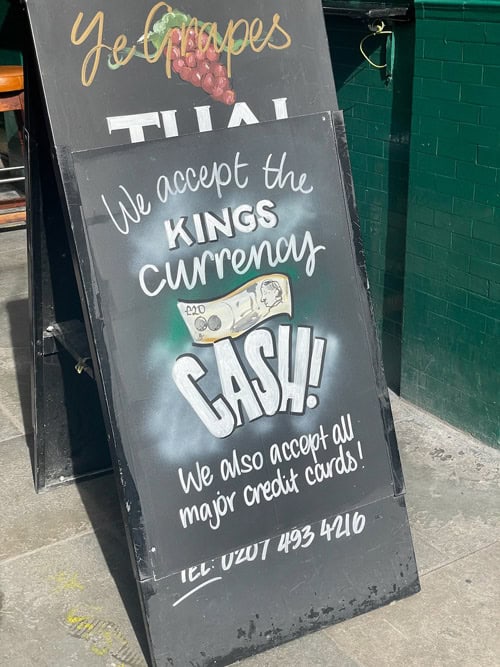
Spotted recently by yours truly outside a pub in London's Mayfair.
Why the pushback? The fees for electronic payments simply add up. A typical taxi driver in London will pay the equivalent of a family holiday to card companies for payment processing each year. Why not try to take cash instead and get another holiday for free? As a frequent passenger, I always make a point of paying cabbies in cash and cursing greedy card companies.
There is even some pushback against digital payments in parts of the world where you wouldn't expect it. Take Sweden, for example, which is widely hailed as Europe's leading model for a country going all cashless. However, as Bloomberg reported on 21 June 2024: "How the Dash to Ditch Paper Money Created a Playground for Criminals".
Needless to say, we will never go back to a time before electronic payments, and privacy-minded Luddites like myself are more likely to live on remote libertarian islands than win any elections in major industrial countries. However, for De La Rue to thrive, it doesn't take more than a decent level of continued use of cash. Which, based on recent numbers, seems to be happening already.
At the end of March 2024, De La Rue had grown its order book for currency printing to GBP 240m – up from just GBP 137m a year earlier.
The turnaround of its currency division is nicely complemented by the authentification business, whose revenue in 2023 grew 12.5%, to GBP 103m. Right now, De La Rue has an order book of GBP 350m stretching across 11 years, with most of that due within the next three years.
If ever there was a good moment to go back to the idea of selling De La Rue as a whole or in pieces, now would be it.
Crystal Amber has maximised pressure
In an ironic twist, Crystal Amber itself had become the target of an activist investor, Saba Capital. In 2021, the New York based hedge fund requested Crystal Amber to sell down its positions and return money to shareholders. At the time, the share price of Crystal Amber was trading at more than a 20% discount to net asset value and the Americans had bought a 26% stake. Saba Capital succeeded, and Crystal Amber has since been in wind-down mode.
This didn't stop Crystal Amber from upping its stake in De La Rue, from 10% in 2023 to now 17%. The fund is now the single-largest investor in De La Rue, followed by investment manager Schroders with a 15% stake. The seven largest De La Rue shareholders jointly own 75% of the company.
It makes sense for Crystal Amber to engage in one final push to maximise the value of its stake, rather than dumping it for an accelerated wind-down. With other shareholders also visibly disgruntled, it would only take two or three larger shareholders to agree to an unsolicited bid. Once a potential bidder rounds up 29% of the share capital, there is little that a company's board can do against a sale.
Make no mistake about it, this type of business is a prized asset that will be seen as such – companies like De La Rue don't hit the market often. The venerable British company is now extremely vulnerable to an unsolicited bid. The UK would probably block an offer by a Chinese bidder, but a suitably qualified investor from a Western country would unlikely face major hurdles even if the board objected. In the UK, takeover capitalism still reigns supreme, which even the current Labour government is unlikely to change.
One party long suspected of wanting to make a low-ball bid is De La Rue's American competitor, Crane NXT. With a USD 3bn market cap, the Americans have the necessary financial firepower to take out De La Rue, whose current market cap is just GBP 240m (USD 305m).
One way or another, De La Rue now equals a sitting duck – and it'll be sold off either in two separate pieces or as a whole. Now that there has been an official board review to this end, it's primarily a matter of engaging all the potential buyers and negotiating the best price. It doesn't even look like this is going to take all that much longer. The new chairman recently stated that "we look forward to completing this process during the current financial year", which ends 30 March 2025.
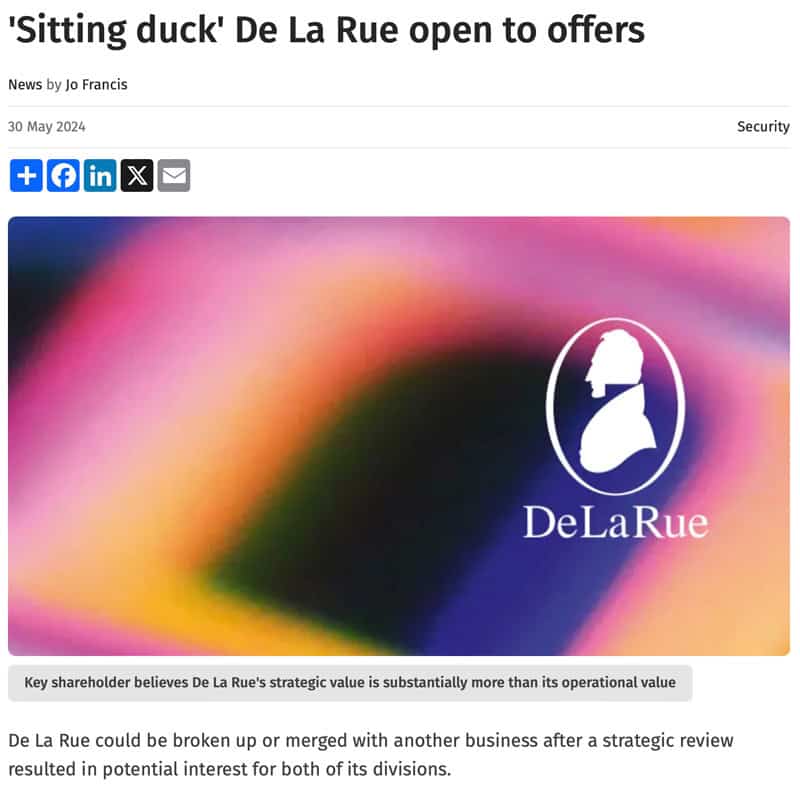
Source: Printweek, 30 May 2024.
Crystal Amber expects De La Rue shareholders to come out with about 150 pence per share. This compares to De La Rue's current share price of 91 pence.
The activists might overstate the firm's value somewhat, and the timeline isn't guaranteed given that unforeseen circumstances are always a possibility. Still, a sale of De La Rue within the next year or so now seems more likely than not. Even if it yielded only 130 pence, that'd be a nice one-year return for anyone climbing onboard now.
For at least one more time, the business of banknotes should prove profitable for some investors.
Cash will continue to deliver, at least for those who look at niche opportunities at the right time.
3 top stocks: why these shares could rise by 300-500%! (German-language video)
What are the most promising investment opportunities that investors should be looking at right now?
Moritz Hessel of Total Return Finanzen and I set out to explore. What sets these stocks apart from others, and what is their long-term potential? And more broadly, how can you profit from asynchronous opportunities and make the most of your investment portfolio?
3 top stocks: why these shares could rise by 300-500%! (German-language video)
What are the most promising investment opportunities that investors should be looking at right now?
Moritz Hessel of Total Return Finanzen and I set out to explore. What sets these stocks apart from others, and what is their long-term potential? And more broadly, how can you profit from asynchronous opportunities and make the most of your investment portfolio?
Did you find this article useful and enjoyable? If you want to read my next articles right when they come out, please sign up to my email list.
Share this post:









